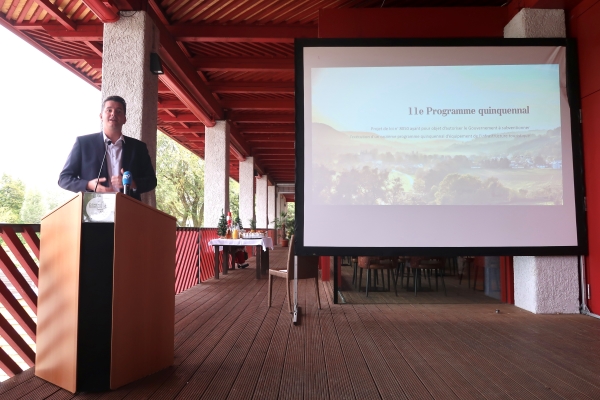 Lex Delles, Minister of Tourism;
Credit: MECO
Lex Delles, Minister of Tourism;
Credit: MECO
On Thursday 20 October 2022, Luxembourg's Minister of Tourism, Lex Delles, presented the bill whose purpose is to authorise the government to subsidise the execution of an eleventh five-year programme for the equipment of tourist infrastructure.
Since 1973, the government's tourism policy has been based on the execution of successive multi-annual plans which have made it possible to create or improve tourist infrastructures in the Grand Duchy of Luxembourg. The new five-year programme makes it possible to subsidise projects relating to tourist infrastructure over the period from 2023 to 2027. While remaining in line with the previous programmes, the draft law relating to the eleventh five-year programme incorporates certain new provisions with a view to facilitating the implementation of the latter. The major changes foreseen in the eleventh five-year programme are as follows:
- Tourism foundations and nature parks were added as potential grant recipients. Municipalities, associations of municipalities, non-profit associations (ASBL) working in favour of tourism (e.g. ORT, tourist offices, etc.) as well as economic interest groups (GIE) promoting tourism at national level (Luxembourg for Tourism and Luxembourg Convention Bureau) will remain eligible for a subsidy, while individuals operating rural accommodation will be excluded from a subsidy on the basis of the eleventh five-year programme. This modification ensures consistency with the new provisions contained in the draft reform of the right of establishment which provide for the obligation to request and obtain a residence permit for the operation of accommodation for a period of three months or more in a year. It should be noted that individuals operating rural lodgings and holding a business permit will be able to benefit from aid under the “SME law”. Farmers who operate a gîte can also obtain a subsidy from the Ministry of Agriculture, Viticulture and Rural Development.
- With regard to the subsidy application procedure, the eleventh five-year programme establishes a detailed list of information to be submitted to the General Directorate of Tourism in order to enable the latter to verify whether the project falls within the provisions of the law. Although this approach has already been applied in the past, such a provision is lacking in the current law.
- A duration of validity of the decision to grant a subsidy is introduced. The project promoter must thus begin the execution of the project within a period of twelve months at most (period renewable once) after the notification of the decision to award a subsidy. This is to allow funds to be freed up for other projects in the event that the applicant delays too much in starting the work or even abandons the project.
- The financing rates will remain unchanged for tourist infrastructures, tourist reception and information structures, digital infrastructures as well as for the conservation and tourist development of the cultural, natural and historical heritage (ceiling set at 50%), while the rates for tourist accommodation will be adapted. The tenth five-year plan provided for financing rates capped at 20% for campsites and rural lodges operated by individuals, while any other type of accommodation could benefit from a maximum rate of 50%. In order to offer fair conditions, the eleventh five-year programme sets a maximum rate of 20% which applies to all types of accommodation, with the exception of youth hostels and unusual accommodation which benefit from a rate maximum of 50%. It should be noted that projects recognised as being of national interest by the Council of Government can reach a financing rate of 100%.
- The financial envelope allocated to tourism infrastructure projects amounted to €60 million for the tenth five-year programme. The eleventh five-year programme plans to increase the budget envelope to €70 million, in order to be able to implement the new tourism strategy which aims to adapt the existing offer to current needs, particularly in active, gastronomic and cultural tourism. The implementation of this strategy requires major investments in the quality of tourist infrastructures to which the eleventh five-year programme provides a response with an appropriate financial allocation.
Minister Delles said: “The five-year programme for the equipment of tourist infrastructure is the backbone of Luxembourg's tourist policy. It allows us to implement our new tourism strategy through major investments that support the creation and modernisation of tourism projects while supporting businesses in the tourism sector. Through certain new provisions concerning the conditions for granting, the beneficiaries and the procedure for applying for subsidies, the eleventh five-year programms ensures the transparency, predictability and quality of investment in tourism, because any investment in tourism is also an investment in the quality of life of Luxembourg residents”.
In order to visualise the effects of the successive multiannual plans on tourist infrastructures, Ramon Hemmer, director of "Erliefnis Baggerweier ASBL", presented the projects resulting from the multiannual plans and the evolution of the "Erliefnis Baggerweier" site. He stressed that this site is dedicated to tourism accessible to all, sustainable and inclusive. Thanks to investments within the framework of the tenth five-year plan, the “Erliefnis Baggerweier” site has notably been able to install a pontoon and amphibious wheelchairs in order to allow disabled people to enjoy the swimming pond. Ramon Hemmer said in this context: "The implementation of the concept of tourism for all, which meets the needs of all visitors including people with disabilities, the elderly and families with children, has enabled us to welcome 50,000 visitors during the 2022 season. This success is also based on the execution of successive multi-annual plans, within the framework of which major investments in the quality of our tourist infrastructures have been made”.








